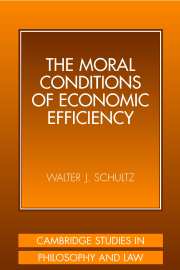Book contents
- Frontmatter
- Contents
- Preface and Acknowledgments
- The Moral Conditions of Economic Efficiency
- 1 Introduction and Synopsis
- 2 A Contextualized Proof of the First Fundamental Theorem of Welfare Economics
- 3 The Moral Thesis: Moral Normative Constraints Are Necessary Conditions of Pareto-Optimal Equilibrium Allocations of Commodities Achieved through Market Interaction
- 4 A Spontaneous Order Objection
- 5 The Roles of Moral Normative Constraints in Relation to Externalities
- 6 The Moral Conditions of Economic Efficiency
- 7 Implications
- Notes
- Bibliography
- Index
4 - A Spontaneous Order Objection
Published online by Cambridge University Press: 23 November 2009
- Frontmatter
- Contents
- Preface and Acknowledgments
- The Moral Conditions of Economic Efficiency
- 1 Introduction and Synopsis
- 2 A Contextualized Proof of the First Fundamental Theorem of Welfare Economics
- 3 The Moral Thesis: Moral Normative Constraints Are Necessary Conditions of Pareto-Optimal Equilibrium Allocations of Commodities Achieved through Market Interaction
- 4 A Spontaneous Order Objection
- 5 The Roles of Moral Normative Constraints in Relation to Externalities
- 6 The Moral Conditions of Economic Efficiency
- 7 Implications
- Notes
- Bibliography
- Index
Summary
Can a population of strict rational egoists achieve efficient allocations of commodities through market interaction in the absence of moral normative constraints? The answer is, “No.” We could now move on to our second central question:
What are the moral normative constraints and other types of normative conditions of market interaction leading to efficient outcomes?
However, I want to establish a stronger claim regarding the possibilities of purely selfish agents. I further claim that, given a class of situations fully described by assumptions (p1)–(p9), strict rational egoists cannot achieve Pareto-optimal equilibrium allocations of commodities at all. To refute this claim, one must show that, under Strict Rational Egoism, a regularity in social behavior could emerge spontaneously from the interactions of purely selfish agents – a regularity that enables efficient outcomes of trade. Thus, we have the following objection to my stronger claim:
If selfish individuals are construed to pursue their own interests from an initial setting in which moral normative constraints are absent and individuals' preferences only range over social states defined by allocations of consumption bundles, their behavior will coordinate into regular patterns (describable as being guided by rules), which in turn will be sufficient to produce optimal outcomes of trade.
I will refer to this objection as the Spontaneous Order Objection. [It is important to bear in mind that this is not a denial of the claim that some type of moral normative constraints are necessary conditions of Pareto efficiency. Rather, it denies that Pareto-optimal equilibrium allocations are not achievable for strict rational egoists in a social situation defined by assumptions (p1)–(p9).]
- Type
- Chapter
- Information
- The Moral Conditions of Economic Efficiency , pp. 58 - 72Publisher: Cambridge University PressPrint publication year: 2001

